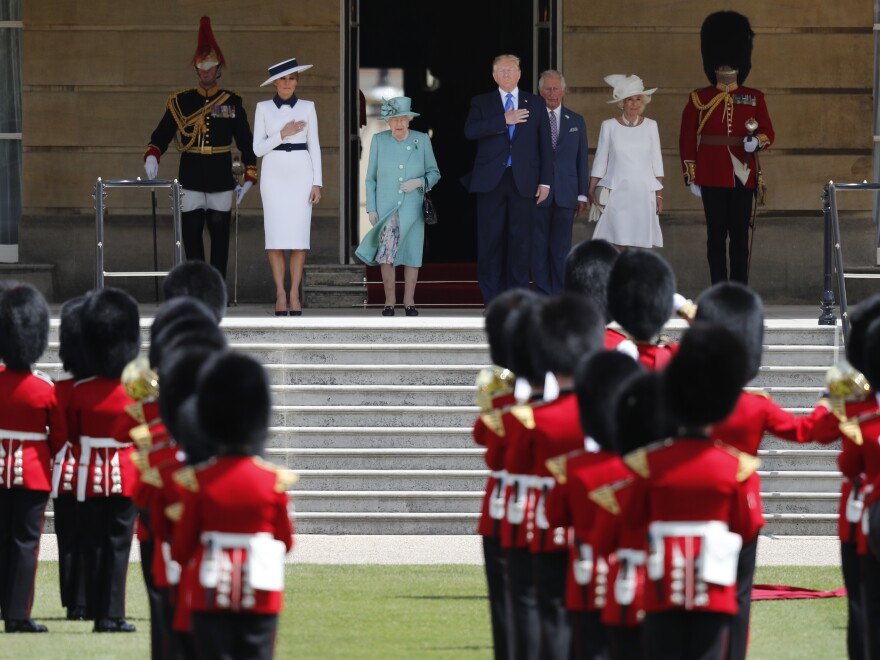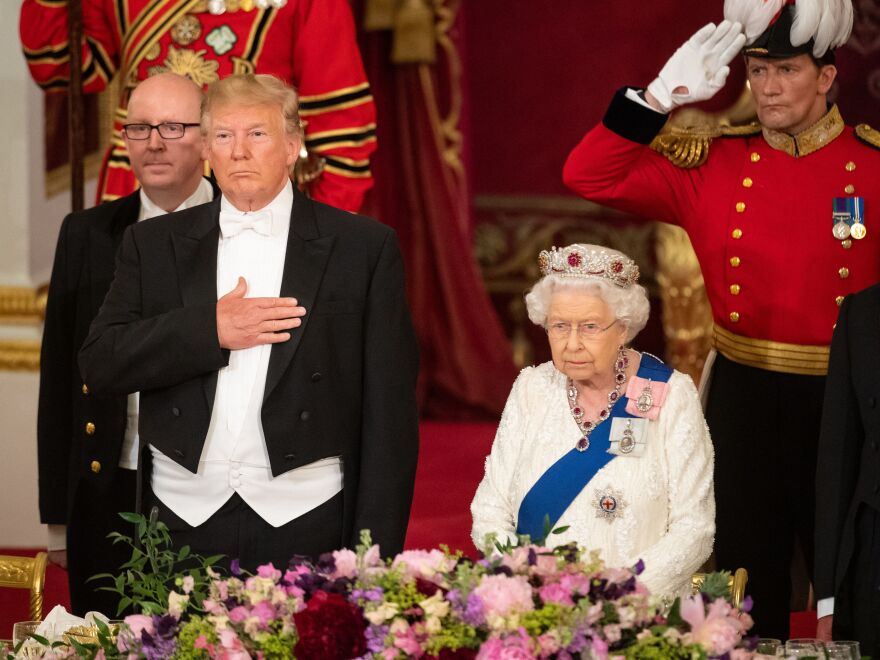The special relationship between the United States and the United Kingdom may not feel very special at the moment. President Trump's three-day visit to the U.K. got off to a rocky start on Monday, when he launched a Twitter attack on London Mayor Sadiq Khan as Air Force One was preparing to land.
.@SadiqKhan, who by all accounts has done a terrible job as Mayor of London, has been foolishly “nasty” to the visiting President of the United States, by far the most important ally of the United Kingdom. He is a stone cold loser who should focus on crime in London, not me......
— Donald J. Trump (@realDonaldTrump) June 3, 2019
A day earlier, Khan had criticized Trump in Britain's Observer newspaper, saying the president was "one of the most egregious examples of a growing global threat" from the far right, which he said "uses the same divisive tropes of the fascists of the 20th century."
Trump tweeted in response that Khan had done "a terrible job" as London mayor and is a "stone cold loser." Trump said Khan reminded him of New York Mayor Bill de Blasio, "only half his height." (De Blasio is about 1 foot taller than Khan.)
From rolling back women's reproductive rights to defending white supremacists and far-right nationalists - President Trump's behaviour flies in the face of ideals America was founded upon.
— Sadiq Khan (@SadiqKhan) June 2, 2019
As the US's closest friends we have a duty to speak out. #Ridgepic.twitter.com/pYDBvh1dU4
That bitter exchange is a far cry from the way the trans-Atlantic friendship is memorialized at Brookwood American Cemetery, in the leafy county of Surrey, a 40-minute train ride southwest of London. More than 460 U.S. service members and civilians who died during or after World War I are buried there. Inscribed on the walls of the cemetery's chapel are the names of more than 500 Americans who were lost in the surrounding seas, including the 131 crew and passengers of the U.S. Coast Guard Cutter Tampa, which was sunk by a German torpedo in the fall of 1918.
In one corner of the lush lawn stands a marble cross that illustrates the early days of what British Prime Minister Winston Churchill would eventually call the "special relationship," the unusually close political, cultural and military ties between the U.K. and its most successful former colony.
Written on the cross is the name Wayne Hart Moore, identified as a second lieutenant of the British Royal Air Force. Moore joined the U.S. Army from Arkansas, says Gail Anderson, a guide at the cemetery, which is overseen by the American Battle Monuments Commission.

"He wanted to fly so he then attached to the British RAF," Anderson explains. "It does just show to everybody the actual strength of the relationship between the two countries."
She says 95% of the attendance at the cemetery's Memorial Day and Veterans Day commemorations is British, adding, "They will come here and remember the Americans and be honored to be a part of it."
President Trump is ostensibly in the U.K. over the next several days to reinforce the special relationship. He is attending a banquet hosted by the queen at Buckingham Palace on Monday evening and will travel to Portsmouth, on England's south coast, to commemorate the 75th anniversary of the D-Day invasion.

But Trump's first two years in office have been a time of strain across the Atlantic.
Lew Lukens, former deputy chief of mission at the U.S. Embassy in London, says Brexit has consumed so much political energy that the U.K. has had little time to focus on issues of shared interest. He adds that Trump's policy choices — such as pulling out of the Paris climate accord and the Iran nuclear deal — have frustrated the British, and the president's blunt style has also taken a toll.
"He has definitely insulted and lashed out in ways that have been gratuitously insulting and that haven't accomplished any foreign policy objective," says Lukens, who spent three decades as a career diplomat before retiring earlier this year.
Monday's Twitter tirade was far from the first time the president has broken with British protocol and insulted U.K. officials. Before Trump visited London last summer, he gave an interview to The Sun, a British tabloid, in which he criticized Prime Minister Theresa May. He said she had ignored his advice on Brexit and had jeopardized her country's hopes for a U.S. trade deal.

"I actually told Theresa May how to do it but she didn't agree, she didn't listen to me," The Sun quoted Trump as saying.
Following a 2017 terrorist attack in London that left seven dead, Trump lashed out at Khan, quoting the mayor out of context, suggesting he wasn't alarmed by the killings, which wasn't true.
Officials in Khan's office reached out to Lukens, asking if he could offer words of support for the mayor. Lukens turned to Twitter to express solidarity with the people of London and praised Khan's leadership, which Lukens says drew a very positive response from Britons.
"But I also got a lot of strong reaction from supporters of the president who felt that I was being disloyal to him ... and they were attacking me online [with] some really vile expressions of things that they hoped would happen to me," Lukens recalls. "Pretty awful stuff."
Lukens says many U.K. officials hope the U.S. public will vote Trump out of office in 2020. He believes that if Trump serves just one term, the special relationship — which he says still operates well at the working level — will recover at the top.
Some observers point out that the White House's relationship with the British leadership could improve if former Foreign Secretary Boris Johnson succeeds outgoing Prime Minister May. Trump and Johnson are friends, are fans of Brexit and are considered politically incorrect populists.
But Robert Singh, a professor of politics at Birkbeck, University of London, is more skeptical about the trans-Atlantic relationship.
"I think it's on the rocks in many respects," Singh says.
He points out that many irritants between the two allies predate President Trump. They include the indefinite detention of enemy combatants at Guantánamo, America's use of capital punishment, and the decision of the U.K. to join the United States in invading Iraq in 2003.
"Iraq really weakened the willingness of the British public to be there almost unconditionally to wage war with the United States," Singh says.
Both countries will suffer if their relations continue to decline, he says. Few allies can provide the U.S. the political and diplomatic support the U.K. has and, for the United Kingdom, there is no better partner than America to amplify British power on the world stage.
Singh notes that the two have spent decades championing an international order emphasizing human rights, democracy and the rule of law. He says that system is now under attack by authoritarian regimes in Russia and China. A weakening of the trans-Atlantic alliance poses a serious threat to the system Britain and America helped build from the ashes of war.
Copyright 2020 NPR. To see more, visit https://www.npr.org. 9(MDAwMzY5MzE4MDEzMTE3ODg5NDA4ZjRiNg004))



